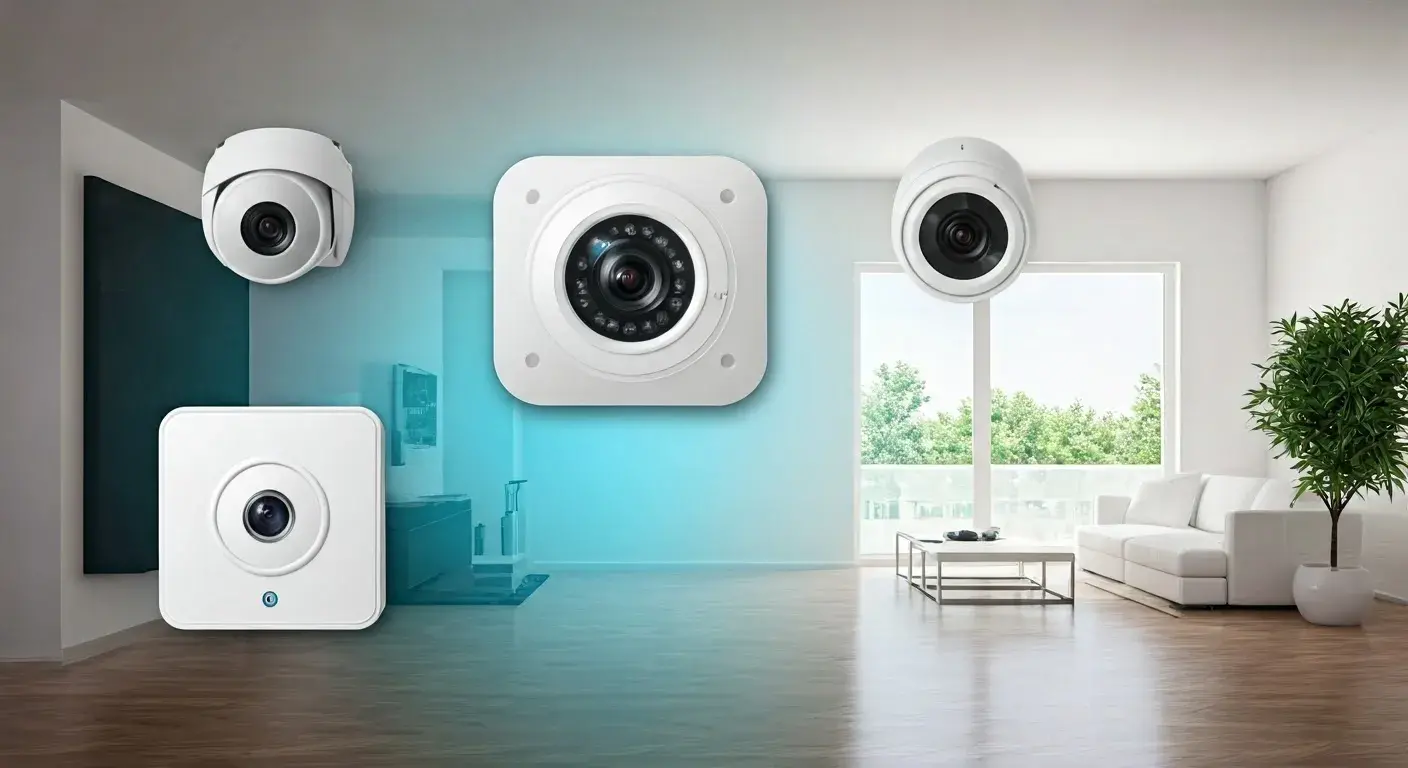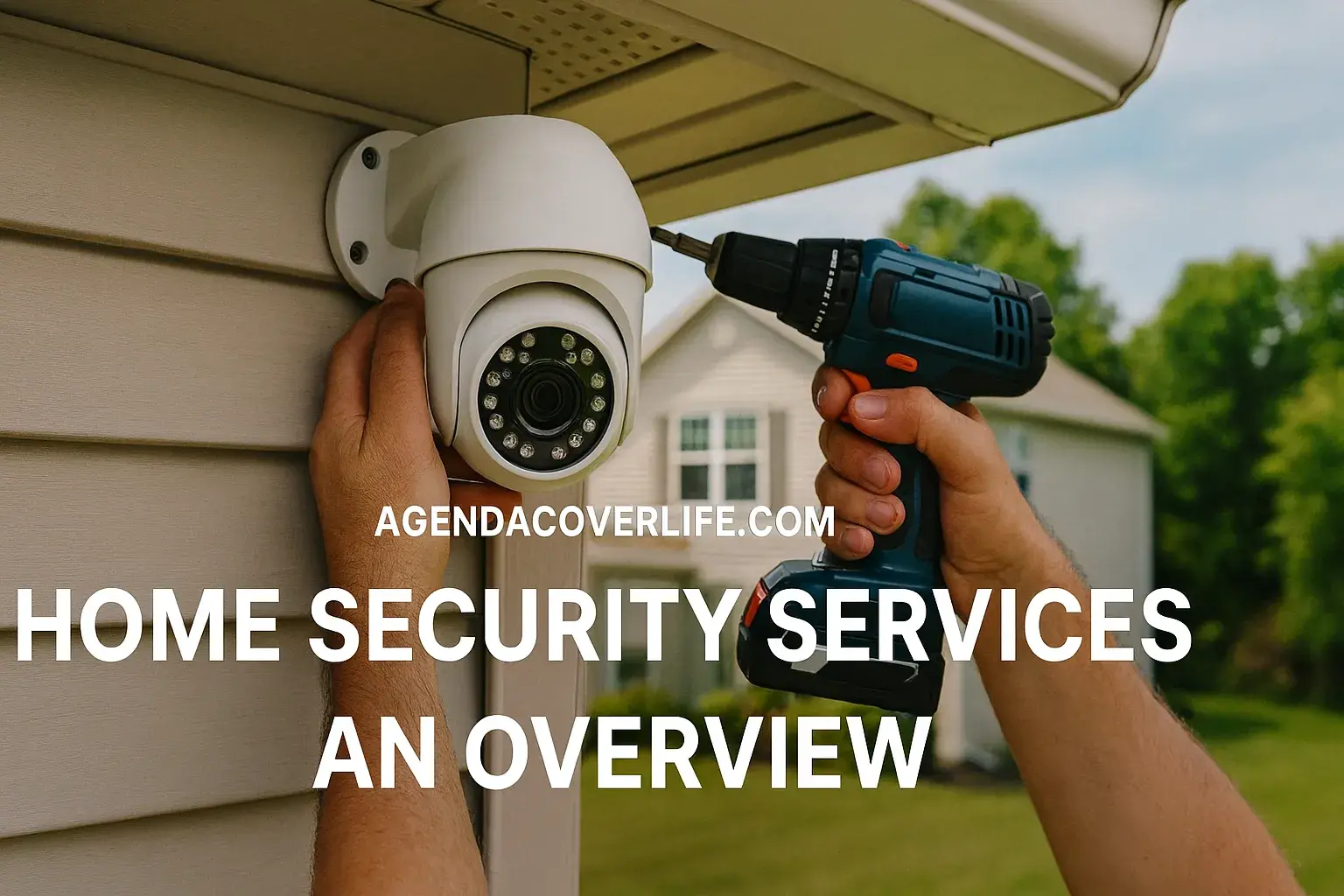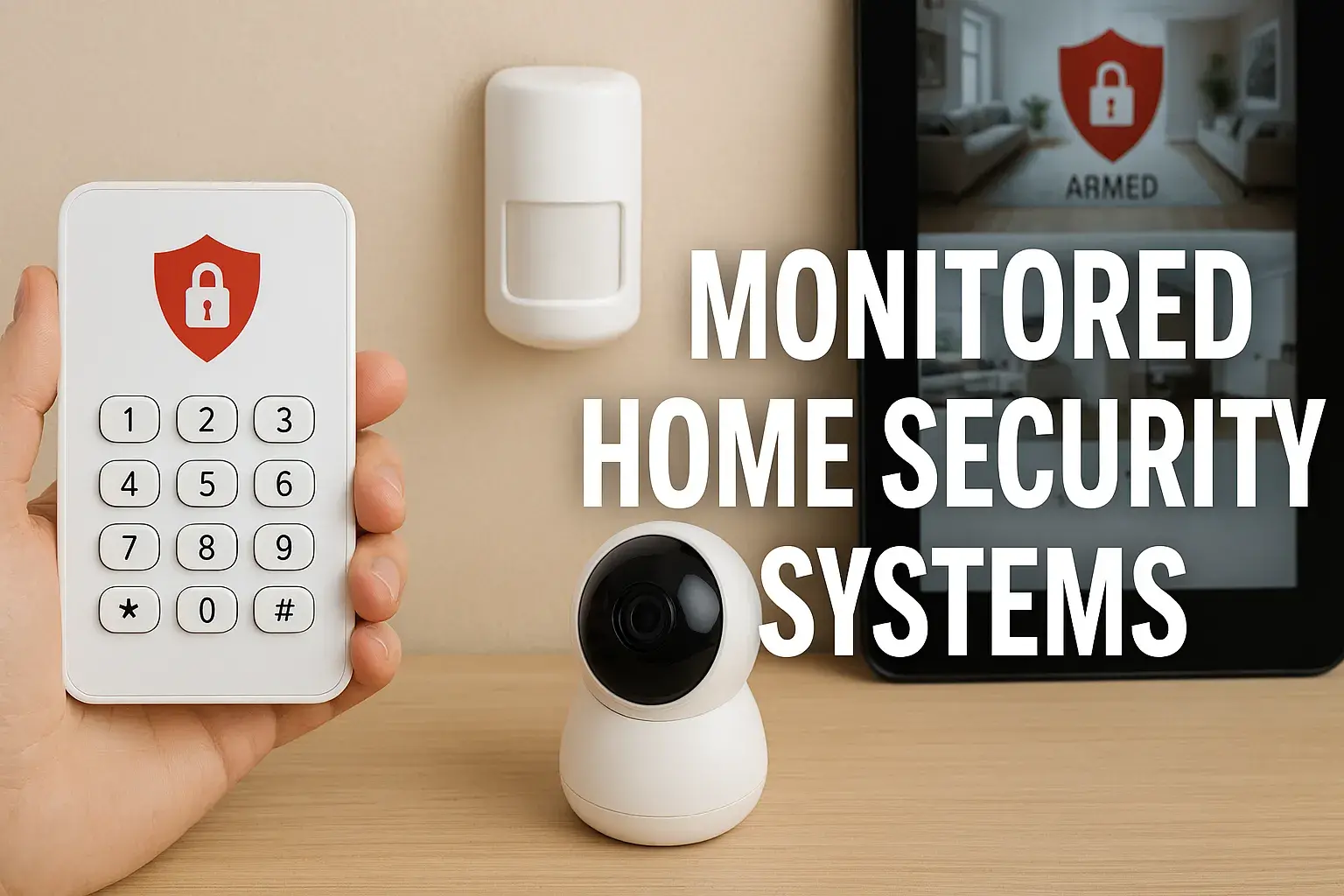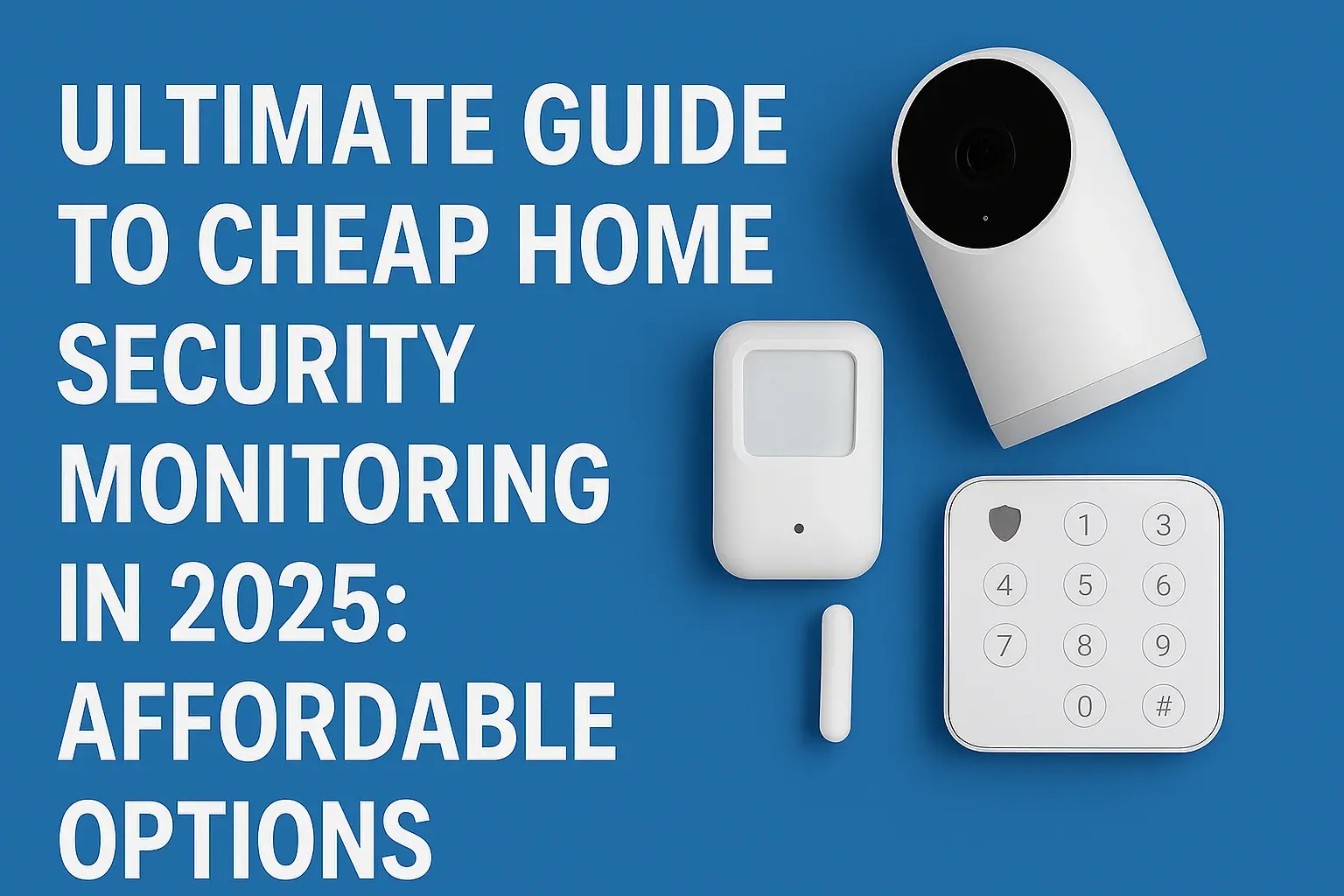In today's world, keeping your loved ones and property safe is very important. A home security system gives you peace of mind. It offers 24/7 monitoring and protects you from different threats. You can either set up a DIY system or choose a professional installation. A good home security system can scare off intruders and send you alerts if there is an emergency.
Understanding Home Security Systems
Home security systems have changed a lot from the old alarm systems. Today's systems include many parts like sensors, cameras, alarms, and control panels. They all work together to protect your home. These systems aim to spot, prevent, and react to possible dangers, giving you more control over your home security, while also offering features that connect to a monitoring centre.
Thanks to new technology, home security systems can now connect easily with other smart home devices. You can manage your security system, check cameras, and get alerts instantly on your smartphone or tablet. This makes it easy to stay in touch with your home, no matter where you go.
The Importance of Protecting Your Home
Our homes should be safe places where we feel protected. Sadly, homes can face threats like break-ins, fires, and natural disasters. A home security system is important. It helps keep your family and belongings safe.
A good security system with cellular backup can prevent intruders from breaking in. It also sends alerts if something goes wrong. When it detects strange activity, it can set off alarms. This will scare off burglars and let you and the police know right away, helping to reduce losses.
In addition, a home security system gives you peace of mind. With sensors, cameras, and reliable monitoring, you can relax. You don’t have to worry as much about threats when you know your home is secure.
Types of Home Security Systems Available
When you think about home security systems, you have many choices, including a wireless home security system. Each type has its benefits and things to think about. Here are some of the most common types:
- DIY Home Security Systems: These systems are made for easy self-installation. They usually have wireless parts like sensors, cameras, and a control panel. DIY systems are often affordable and allow you to customize and expand as needed.
- Smart Home Security Systems: These systems connect with other smart devices in your home. You can control them from your smartphone. This lets you arm or disarm the system, check the cameras, and get alerts from anywhere.
- Professionally Monitored Systems: These provide extra security by linking to a central monitoring station. When an alarm goes off, trained professionals will check the situation and contact you or the right authorities. This kind of professional monitoring offers quick response times and helps you feel more secure.
Choosing between these systems depends on what you need, your budget, and how comfortable you are with technology. Think about the size and layout of your home and any specific security worries you may have.
Top Home Security Systems Reviewed
Choosing the best home security system can be overwhelming because there are many options. We have made it easier for you by gathering reviews of some top-rated security systems. Our reviews show their features, benefits, and drawbacks. We want to help you get the information you need to choose what fits your needs.
We looked at popular companies like ADT and Vivint, as well as easy-to-install systems like Ring and SimpliSafe. Each system was checked based on how simple it is to use, how reliable it is, the features it offers for complete home security, and how good its customer support is.
Features to Look for in a Security System
When you look at home security systems, some features are very important for good protection. A strong motion sensor and door sensors must help you see any movement inside your home when the system is on. Choose systems with adjustable sensitivity levels. This can help cut down on false alarms caused by pets or other things that are not real threats.
Being able to connect with smart devices like smart locks can greatly improve your home security. With smart locks, you can lock and unlock your doors from far away. You can set up temporary access codes for visitors and get alerts when someone comes in or goes out of your home. This gives you more control and makes your home safer.
For extra safety, think about systems that have advanced features like facial recognition. This can help you recognize people who enter your home and send you alerts. Facial recognition can be really helpful for families with young kids or older relatives. It helps you know when they are coming and going.
DIY vs. Professional Installation
Choosing between a DIY system and a professionally installed system is key when you want a home security system. DIY systems can save you money and give you the chance to change and grow your setup over time. In contrast, the professional installation brings expert help. This ensures the sensors are placed well and reduces any problems.
You should think about your comfort with technology, how your home is laid out, and your budget, including any potential installation fee. If you feel sure about your skills and like to get things done yourself, a DIY system could be good for you. But if you want peace of mind, then professional installation can be the better choice.
Benefits of DIY Home Security Systems
DIY home security systems are very popular these days, and it's easy to see why. One major benefit is the money you can save. By choosing a DIY system with various DIY options, you can avoid the costs of professional installation. This makes it easier for people to secure their homes.
Another great thing about DIY systems is their flexibility. Most DIY setups let you start with the basics and add features like sensors, cameras, and smart locks as your needs change. This means you only pay for what you need.
Many DIY systems also come with easy-to-use control panels and apps that are compatible with smart home products. This makes it simple to manage your security settings, check your home from a distance, and get alerts right away. You stay in charge of your system without needing help from a third party.
When to Consider Professional Installation Services
DIY home security systems can work well for many homeowners. However, some situations call for professional installation services. If your home is large or has many entry points, professionals can check your property. They will place sensors in the best spots to make sure you have coverage everywhere. Their experience helps keep your whole home safe.
Professional installation is also useful when connecting your security system to a monitoring service. Security companies with professional monitoring have trained staff. They will respond to alarms, contact the police, and help keep you safe during an emergency.
Moreover, some security companies provide regular maintenance and support for the systems they install. This means that if there are any tech issues or problems, experts will fix them quickly. This reduces downtime and makes sure your system runs well.
Integrating Smart Technology with Home Security
The world of home security is changing thanks to smart technology. It is changing how we keep our homes and family safe. By using smart devices like cameras, sensors, and voice assistants with your security system, you can enjoy new options that make things easier and safer.
For instance, you can get alerts on your smartphone right away if a camera sees movement. You can also lock your front door from a distance or use voice commands to set your security system. All of this is now possible with smart technology.
The Role of AI and Machine Learning
Artificial intelligence (AI) and machine learning are becoming very important for smart home security systems. These technologies help systems learn your habits, notice familiar faces, and tell the difference between normal activities and possible threats. This can lead to fewer false alarms and better accuracy.
AI cameras can tell the difference between a delivery person at your door and a potential intruder trying to get in. They can also learn to recognize your family and pets. You will only get alerts when something unusual happens.
Machine learning analyzes data from different sensors in your home. It adapts to your routines and can spot strange activity better over time. This approach helps keep you safe by preventing problems before they start.
Smart Locks and Security Cameras
Smart locks and security cameras are very popular and useful for home security. Smart locks let you enter your home without a key. You can lock and unlock your doors using your phone. You can also create temporary access codes. This way, you can see who comes and goes from your home.
Security cameras help one feel safer and provide proof if something happens. New cameras come with many features. These include high-definition video, night vision, two-way audio, and motion detection. Some have facial recognition for better security.
When picking smart locks, a smart video doorbell, and security cameras, think about a few things. Check if they work with your current smart home setup. Look at video storage options, whether local or cloud-based. Also, consider any subscription plans available.
Security Systems on a Budget
Protecting your home doesn’t have to cost a lot. Many low-cost security options provide great safety without spending too much, including video doorbells. You can choose from both DIY systems and professional monitoring services.
Check out starter kits that come with key items like a base station, sensors, and a control panel. You can then add extra devices later as your budget grows.
Affordable Security Solutions for Every Home
Budget-friendly security systems often have strong features. Many low-cost options come with motion detection, door and window sensors, and mobile alerts. These help you find out about any security issues quickly.
Look for systems that give you flexible monitoring options, including outdoor security cameras. Some companies let you self-monitor your system for free. You could also pick a basic monitoring plan that does not have long-term contracts. This allows you to choose how much protection you want based on your budget.
Investing in even a simple and affordable security system is a smart way to protect your home and family.
Tips for Saving Money on Home Security
Achieving financial freedom and keeping your home safe is a tricky balance. Here are some easy ways to save money on home security without losing protection:
- Bundle your home and auto insurance: Many insurance companies give discounts if you combine your home and auto policies. This can lead to big savings.
- Look for discounts: Some security companies provide discounts for seniors, military members, or people in certain groups. Always ask about discounts before you buy.
- Consider refurbished equipment: Buying refurbished security devices can save you money. Just make sure to purchase them from trustworthy sellers who give warranties.
Using these tips can help you have better financial control while making sure your home is secure.
Advanced Security Features and Their Benefits
The new developments in home security systems go beyond just basic safety. They now offer many smart features that improve safety, convenience, and peace of mind. From high-tech motion sensors to monitoring the environment, these features help keep you safe and aware.
If you want to stop burglars, deal with dangers at home, or just know what is happening, these advanced security features can help you.
Motion Sensors and Mobile Alerts
Motion sensors, also referred to as motion detectors, are key parts of a good home security system. They sense movement in a specific area. If there is any suspicious activity, they activate an alarm or send alerts to your smartphone app.
Modern motion sensors use smart technology to reduce false alarms. For example, pet-immune sensors can tell the difference between pets and people. This feature stops your pets from accidentally triggering the alarm.
With instant mobile alerts, you will know about any security issues no matter where you are. Whether you are at work, on vacation, or not at home, mobile alerts keep you updated in real-time. This lets you take action quickly.
Environmental Monitoring and Emergency Response
Modern home security systems do more than just detect intrusions. They also include environmental monitoring features. These features help protect your home from dangers like fires, floods, and carbon monoxide leaks.
Smoke and carbon monoxide detectors work with your security system and security sensors. They can sound alarms and alert you and emergency services if there’s a problem. Water leak sensors can be installed in areas where leaks are likely. They catch leaks early to stop expensive water damage.
Professional monitoring services make emergency help even better. When an alarm goes off, trained experts check the situation and call emergency services for you. This ensures a quick and well-organized response.
Conclusion
In conclusion, keeping your loved ones and belongings safe is very important. Picking the right home security system that fits your needs can give you peace of mind and protection. You need to understand why home security matters and consider the best way to protect your home. You should also look at the best systems available and think about using smart technology to protect your home. You can choose to set it up yourself or have a professional installation. It is good to focus on features like motion sensors and mobile alerts to make your security even better. Remember, putting money into a reliable home security system is an investment in the safety of your family. Stay informed and stay secure.







